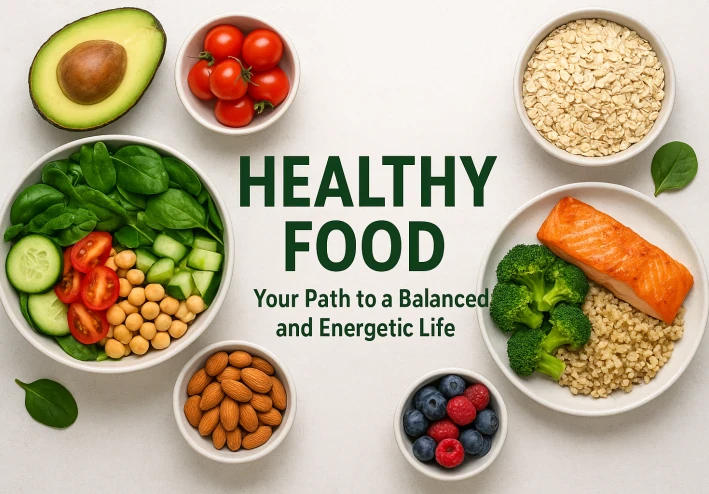
Healthy Food: Your Path to a Balanced and Energetic Life
Healthy Diet: Tips for Optimal Wellbeing
Ever thought a healthy diet could change your life? What you eat is key to your health. Yet, many don't see its full power for wellbeing and fitness. Learning good nutrition is vital for better health.
In this article, you'll learn more than just diet basics. You'll get tips for managing weight, boosting energy, and sharpening your mind. Start your health journey with the food you eat!

Key Takeaways
- A healthy diet is foundational for overall health and fitness goals.
- Understanding nutrition basics is crucial for cultivating better eating habits.
- Implementing a balanced diet can enhance energy levels and mental health.
- Weight management can be achieved through mindful eating practices.
- Incorporating diverse food choices supports optimal wellbeing.
The Importance of a Healthy Diet for Overall Health
A healthy diet is key to feeling good and staying healthy. Knowing about nutrition helps you choose the right foods. This choice affects your body and mind. Eating well helps prevent chronic diseases, which is crucial today.
Understanding Nutrition Basics
Nutrition basics are important for a balanced diet. They include:
- Eating the right number of calories for your lifestyle
- Matching what you eat with how much you move
- Eating a variety of foods for all nutrients
Learning these basics can lower your risk of obesity and improve your health.
Chronic Disease Prevention
A healthy diet is vital for avoiding chronic diseases like heart disease and diabetes. Eating foods full of vitamins and healthy fats helps your body fight off these diseases. A good diet also boosts your mood, energy, and helps with weight control.

| Disease | Nutrition's Role | Healthy Foods |
|---|---|---|
| Heart Disease | Reduces cholesterol levels and blood pressure | Fruits, vegetables, whole grains, lean protein |
| Diabetes | Improves blood sugar control | Whole grains, legumes, healthy fats |
| Obesity | Promotes better weight management | Lean proteins, fiber-rich foods, low-calorie vegetables |
Healthy Diet: Essential Components for Balanced Eating
A balanced diet includes many food groups for different nutrients. Knowing what to eat can boost your health and energy.
Five Food Groups You Should Include
To eat well, focus on these five food groups:
- Starchy carbohydrates: Whole grains, bread, pasta, and rice give you energy and fiber.
- Fruits and vegetables: Eating different colors and types gives you lots of vitamins and minerals.
- Protein sources: Lean meats, beans, legumes, and nuts help repair muscles and keep you healthy.
- Dairy or alternatives: This group adds calcium and vitamin D for strong bones.
- Healthy fats: Avocados, olive oil, and fatty fish are good for your heart and help you absorb nutrients.
The Role of Macronutrients and Micronutrients
It's key to know the difference between macronutrients and micronutrients. Macronutrients are carbs, proteins, and fats, each with its own role:
- Carbohydrates: They give you energy for daily tasks.
- Proteins: They help fix tissues and support growth.
- Fats: They're important for making hormones and absorbing nutrients.
Micronutrients, like vitamins and minerals, help with things like fighting off infections and keeping bones strong. For example, vitamin C boosts your immune system, and calcium keeps bones strong. Eating a variety of foods rich in both macronutrients and micronutrients is good for your overall health.

Meal Planning for Optimal Nutrition
Effective meal planning is key for a healthy lifestyle. It helps you eat well and manage calories. This way, you get all the nutrients you need and enjoy your meals more.
Creating a Balanced Weekly Menu
Creating a balanced menu means picking foods that are nutritious and not too many calories. A good plan should have:
- Fruits
- Vegetables
- Whole grains
- Lean proteins
- Healthy fats
This mix ensures you get all the nutrients you need. Remember to keep an eye on your calorie goals for each meal.
Portion Control and Mindful Eating
Controlling portions is crucial for avoiding overeating and staying healthy. It makes you think about how much you eat. Using smaller plates or measuring servings helps you know the right amount.
Mindful eating goes hand in hand with portion control. It makes you focus on the taste, texture, and joy of eating. This way, you develop a better relationship with food and help manage your weight. Use food labels to track calories and guide your choices.
Incorporating a Plant-Based Diet into Your Lifestyle
Switching to a plant-based diet can boost your health and happiness. Eating more fruits and veggies gives you vital nutrients. It also helps the planet. Knowing the good things about a plant-based diet can make the change easier.
Benefits of Fruits and Vegetables
Fruits and veggies are key in a plant-based diet. They're full of vitamins, minerals, and antioxidants. Eating them regularly can make your heart healthier, lower cholesterol, and reduce disease risks.
Adding different colors of produce to your meals gives you a wide range of nutrients. This improves your overall health and well-being.
How to Transition to Plant-Based Eating
Switching to a plant-based diet can be fun and easy. Begin by adding more fruits and veggies to your meals. Try a side salad or a fruit smoothie for breakfast.
Slowly cut down on animal products. Look for recipes with legumes, beans, and whole grains. They provide protein without losing flavor or nutrition. With practice, eating sustainably will become natural.
Conclusion
The path to optimal wellbeing begins with a healthy diet. Knowing what to eat and how to plan meals helps you make better choices. This way, you boost your health and energy for the long run.
This article showed how important it is to eat a variety of foods. By mixing different nutrients, you can create a diet that suits you. Remember, your choices today shape your future, so invest in your health.
Using these tips can lead to a healthier, happier life. Eating a wide range of foods and staying active are key. Stay dedicated and watch your health improve for a brighter future.
FAQ
What is a healthy diet?
A healthy diet is about eating a variety of foods. It includes carbs, proteins, fats, vitamins, and minerals. These nutrients help your body work well.
How can I manage my weight with a healthy diet?
To manage your weight, balance what you eat and how much you move. Plan your meals and control portions. Eat whole grains, lean proteins, and healthy fats. Avoid processed foods.
What role do vitamins and minerals play in a healthy diet?
Vitamins and minerals are key for your body. They help with energy, immune function, and bone health. Foods like fruits, veggies, and whole grains are full of them.
What are some key components of meal planning?
Meal planning involves a balanced menu with all food groups. Think about calories and portion sizes. Diverse foods meet nutritional needs and make meals fun.
How can a plant-based diet benefit my health?
A plant-based diet lowers the risk of many diseases. It's rich in fruits, veggies, and whole grains. These foods are full of vitamins and antioxidants.
What are some effective strategies for transitioning to a plant-based diet?
Start by adding more fruits, veggies, and whole grains. Reduce animal products. Try plant-based proteins like legumes and nuts to get all nutrients.
How can mindful eating contribute to a healthy diet?
Mindful eating means focusing on your food. Notice taste, texture, and satisfaction. It helps prevent overeating and improves your food relationship.
Why is understanding macronutrients important?
Macronutrients—carbs, proteins, fats—are vital for energy and growth. Balancing them supports health and fitness.






























